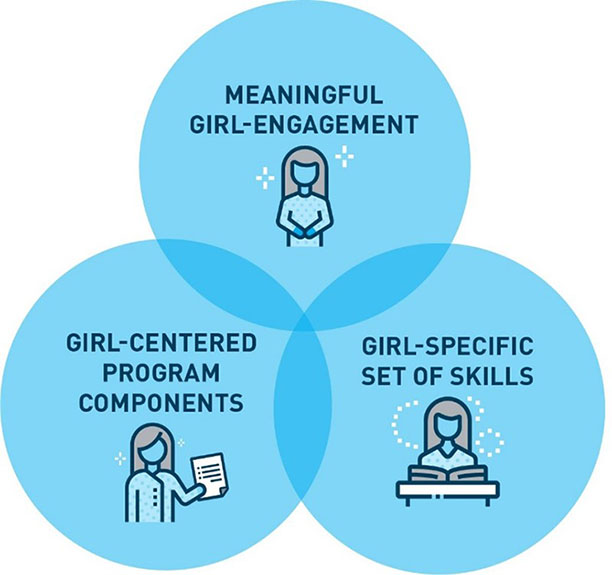
Photo Credit: SDI Productions/Getty Images
As the world marks the 25th anniversary of the Beijing Declaration, the global community must take action and be bold in realizing our collective vision of a gender-equal world by intentionally investing in and advancing a girl-centered approach to development. We believe that girls should be front and center at driving solutions to the problems they face, thereby increasing the pipeline of women leaders, entrepreneurs and changemakers for tomorrow.
The Girl-Centered Skills Development: A Learning Agenda (lead author Kate Plourde, FHI 360), a collaboration between UNICEF and FHI 360, launched in time for the International Day of the Girl — a celebration of the diversity, strength and resilience of girls around the world. This year, the celebration came in the midst of global uncertainty – the COVID-19 pandemic has disrupted the lives and opportunities of millions of girls and women around the world and threatens to roll back decades of gains.
To transform their own lives, girls need the skills demanded of them by the 21st century — skills in science, technology, engineering and mathematics (STEM), digital technologies and social entrepreneurship, as well as transferrable skills such as problem solving, negotiation and communication. They need learning environments that are safe, inspiring, relevant and meaningful with opportunities to set their agendas, engage with mentors and role models, and build strong networks.
UNICEF and FHI 360 are advancing this evidence-based framework and learning agenda that promotes three interlinked, essential elements to accelerate progress for girls, which complements programming.

Engage girls meaningfully
“Girls are really not part of [the evaluation] … but just told what happens.” — Jona Claire Turalde, United Nations Girls’ Education Initiative Young Leader, Philippines
Girls know what solutions work best for them. Girls should therefore be involved at every stage of program development – from planning and implementation to monitoring and evaluation. When girls are engaged in these processes, programs are more relevant and impactful. They are the key audience of such programs, and their engagement at all levels is not only a basic necessity – it is also a fundamental right.
Program example: The organization Feminist Approach to Technology in India enables girls to make decisions on what they want to learn and explore within the topics of STEM, technology access and feminist rights. Creating a space for girls to determine the skills they need for their future respects their agency and determination.
Invest in a girl-specific set of skills
“STEM skills are the future.” — Maryam Rehman, The World with MNR, United Nations Girls’ Education Initiative Young Leader, Canada and Pakistan
Adolescent girls are not a homogenous group, and programs for girls should be rooted in the specific needs and context of those being served. Investing in girls’ education and skills, including STEM, digital and transferable skills, and social entrepreneurship, is a critical pathway to their economic independence and professional and personal empowerment. A girl-centered, skills-building program provides a set of skills that responds to the demand, circumstances and opportunities of girls.
Program example: The Girls Got IT initiative in Lebanon, supported by UNICEF, conducts skill-building workshops with adolescent girls on coding, game design, mobile apps, artificial intelligence, engineering and entrepreneurship, and facilitates mentoring events and opportunities with STEM industry professionals. By pairing STEM skills and mentoring, girls are able to make better decisions about career options and build a support network while acquiring skills.
Provide girls with opportunities to practice skills
“Girls who do not have the confidence will not believe in their skills.” — Nivaal Rehman, The World with MNR, United Nations Girls’ Education Initiative Young Leader
Building skills alone is not enough to change the trajectory of girls’ lives. Girls must also have the power and agency to put those skills to use. They must have a physically and emotionally safe environment in which to learn and be able to interact with mentors and role models from whom they can learn. And, girls must be provided with opportunities to put their skills to use in their lives.
Program example: The Safe and Smart Savings Products for Vulnerable Adolescent Girls project, led by the Population Council and MicroSave in Kenya and Uganda, provides girls with individual savings accounts in trusted institutions, weekly group meetings on health and financial education with a female mentor in a safe space, and parent meetings. Girls’ aspirations and confidence grow when savings and mentoring activities are combined – a form of learning by doing – and key stakeholders, such as parents, are engaged.
The need for a girl-centered approach to skills development has never been more urgent. We recognize that investment in skills development initiatives is one critical pathway to building girls’ and young women’s self-confidence and resilience, increasing their access to opportunities, ensuring their equal participation in the labor force and promoting their empowerment. The time has come to invest directly in girls’ ideas and voices. Let’s seize this moment to reimagine a future in which every girl can aspire and transform her life.
